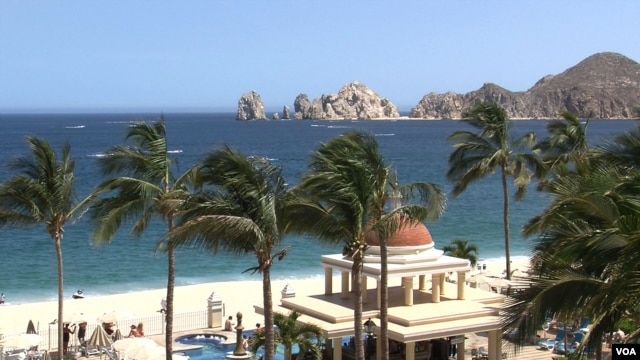
Los Cabos, Mexico. (VOA/Greg Flakus)
LOS CABOS, Mexico - The leaders of 19 nations and the European Union, known as the Group of 20, are gathering at the Mexican beach resort Los Cabos for a two-day summit, to be held Monday and Tuesday, with worries about economic crises in several European countries overshadowing most other issues. Officials from G20 working groups say the drive to help needy countries remains a major focus of the summit.
Mariachi musicians greeted delegations from around the world as they arrived at one of Mexico's most luxurious beach resort areas. But, although much of their work in the next two days will take place in hotels and conference halls within view of the beaches, the leaders attending this summit will be spending much of their time talking about the debt problems facing Greece, Spain and Italy.
The G20 host, Mexican President Felipe Calderon, says participants in the summit should firm up their pledges to the International Monetary Fund of more money to deal with the debt crisis. G20 nations promised to provide more than $400 billion in new loans in April, but several have yet to follow up on that pledge.
Representatives from some non-governmental organizations are worried that the G20 focus on the problems of relatively rich nations in Europe might detract from efforts to help poor, non-industrialized countries where most of the world's neediest people reside.
"The last two summits have been dominated by the Eurozone crisis, by Greece, and that means that there is very little agenda time for other issues," said Christina Weller, lead economic analyst for London-based Catholic Agency for Overseas Development.
Weller argues that G20 leaders would be helping their own countries by doing more to help the millions of people in developing nations who cannot participate in the global economy. She says poverty is more than a moral blight.
"It is also an economic problem. It lowers demand. That is where the growth should be is in those markets and if you tackle poverty, everybody benefits," said Weller.
But, although the world leaders who meet here for two days may have little time to discuss much beyond the debt crisis in Europe, officials from those nations continue to advance their work on previously approved agendas such as economic development and poverty reduction.
The director of Mexico's Agency for International Development, Rogelio Granguillhome, who co-chairs the G20 Development Working Group, told reporters that this effort has advanced steadily, in the past few years.
He says this group, which met here in Los Cabos in May, is presenting leaders with concrete and precise recommendations on such issues as infrastructure development, food security and green growth. This group also worked in concert with representatives of the business sector, who are holding a concurrent meeting, called the B20, at a nearby beach hotel.
The director of policy and business practices for the International Chamber of Commerce, Stefano Bertasi, says corporate leaders from around the world take part in these forums in an effort to be partners with governments in promoting economic development.
"We want this to be an enduring, ongoing process of collaboration and discussion that takes place before summits, during summits and after summits," he said.
Bertasi says that, although there are areas of concern for businesses, like the rise of protectionism and higher taxes, there are many areas of mutual interest such as the promotion of green energy. He says the way business leaders often work out differences on various issues can serve as a model for government leaders as they struggle to find agreement.
"If we bring consensus views and ideas, brought by business to government, hopefully, that will help governments themselves come to consensus on some of these issues," said Bertasi.
Groups that might want to express disagreement with any of the actions taken at either the G20 or the B20 meetings are quite restricted in what they can do and where they can stage a protest. The meetings are being held under tight security in an area along the tip of the Baja peninsula where all access roads are patrolled by heavily armed Mexican federal police and soldiers. Helicopters swoop overhead on a regular basis and Mexican Coast Guard and Navy ships are anchored just offshore, in plain sight of the summit participants and the thousands of tourists staying at beachfront hotels. |
|
